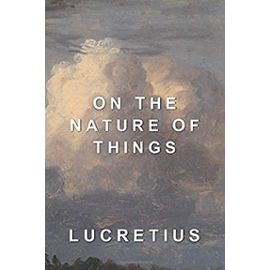Lucretius, William Ellery Leonard:On the Nature of Things
- Taschenbuch ISBN: 1521852715
[SR: 1629768], Paperback, [EAN: 9781521852712], Independently published, Independently published, Book, [PU: Independently published], Independently published, De rerum natura “On t… Mehr…
[SR: 1629768], Paperback, [EAN: 9781521852712], Independently published, Independently published, Book, [PU: Independently published], Independently published, De rerum natura “On the Nature of Things” is a first-century BC didactic poem by the Roman poet and philosopher Lucretius (c. 99 BC – c. 55 BC) with the goal of explaining Epicurean philosophy to a Roman audience. The poem, written in some 7,400 dactylic hexameters, is divided into six untitled books, and explores Epicurean physics through richly poetic language and metaphors. Lucretius presents the principles of atomism; the nature of the mind and soul; explanations of sensation and thought; the development of the world and its phenomena; and explains a variety of celestial and terrestrial phenomena. The universe described in the poem operates according to these physical principles, guided by fortuna, "chance," and not the divine intervention of the traditional Roman deities. Lucretius wrote this epic poem to "Memmius", who may be Gaius Memmius, who in 58 BC was a praetor, a judicial official deciding controversies between citizens and the government. There are over a dozen references to "Memmius" scattered throughout the long poem in a variety of contexts in translation, such as "Memmius mine", "my Memmius", and "illustrious Memmius". According to Lucretius's frequent statements in his poem, the main purpose of the work was to free Gaius Memmius's mind of the supernatural and the fear of death—and to induct him into a state of ataraxia by expounding the philosophical system of Epicurus, whom Lucretius glorifies as the hero of his epic poem. However, the purpose of the poem is subject to ongoing scholarly debate. Lucretius refers to Memmius by name four times in the first book, three times in the second, five in the fifth, and not at all in the third, fourth, or sixth books. In relation to this discrepancy in the frequency of Lucretius's reference to the apparent subject of his poem, Kannengiesse advances the theory that Lucretius wrote the first version of De rerum natura for the reader at large, and subsequently revised in order to write it for Memmius. However, Memmius' name is central to several critical verses in the poem, and this theory has therefore been largely discredited. Bruns and Brandt have set forth an alternative theory that Lucretius did at first write the poem with Memmius in mind, but that his enthusiasm for his patron cooled. Stearns suggests that this is because Memmius reneged on a promise to pay for a new school to be built on the site of the old Epicurean school. Memmius was also a tribune in 66, praetor in 58, governor of Bithynia in 57, and was a candidate for the consulship in 54 but was disqualified for bribery, and Stearns suggests that the warm relationship between patron and client may have cooled (sed tua me virtus tamen et sperata voluptas/ suavis amicitiae quemvis efferre laborem, "But still your merit, and as I hope, the joy/ Of our sweet friendship, urge me to any toil"). There is a certain irony to the poem, namely that while Lucretius extols the virtue of the Epicurean school of thought, Epicurus himself had advised his acolytes from penning poetry because he believed it to make that which was simple ove, 8298098011, Ancient & Classical, 271623011, Ancient, Classical & Medieval, 10248, Poetry, 17, Literature & Fiction, 1000, Subjects, 283155, Books, 11047, Greek & Roman, 11019, Philosophy, 3377866011, Politics & Social Sciences, 1000, Subjects, 283155, Books, 468236, Literature, 491406, American Literature, 491394, Creative Writing & Composition, 491408, English Literature, 491404, Literary Theory, 684272011, World Literature, 468206, Humanities, 465600, New, Used & Rental Textbooks, 2349030011, Specialty Boutique, 283155, Books, 491428, History & Surveys, 468232, Philosophy, 468206, Humanities, 465600, New, Used & Rental Textbooks, 2349030011, Specialty Boutique, 283155, Books<









